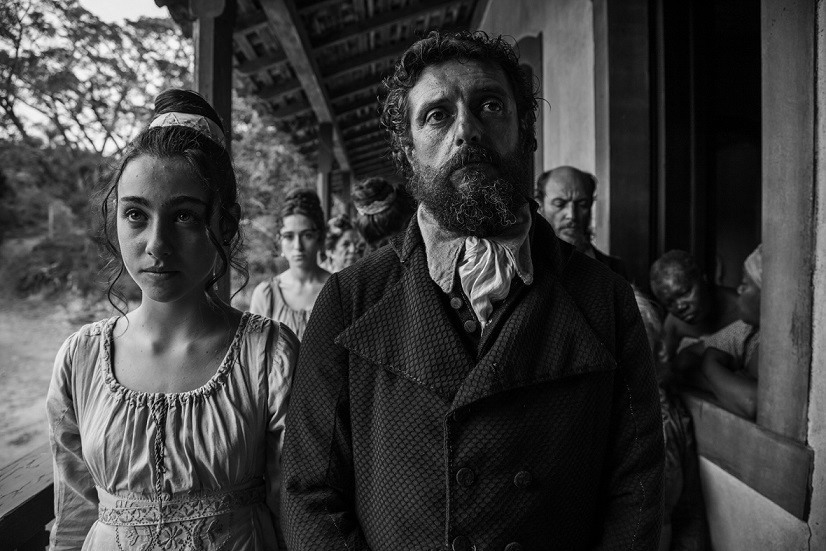Daniela Thomas writes and directs films and plays, creates opera and theater sets, designs exhibitions, and creates installations. She is based in São Paulo but her work has been seen, exhibited, and played around the world. Her film credits include “Foreign Land,” “Midnight,” and “Sunstroke.”
“Vazante” will premiere at the 2017 Berlin International Film Festival on February 10.
W&H: Describe the film for us in your own words.
DT: “Vazante” is a faithful portrait of life in the backlands of Brazil in the early 19th century. It tells an emotional story that portrays the insidious side of miscegenation and exposes the common practice of the forced marriage of young girls.
W&H: What drew you to this story?
DT: The starting point of “Vazante” is a story my father told me about a great-great-grand-uncle of his. It triggered my curiosity about life in Brazil of yore. I felt the urge to re-create the early moments of the forging of our identity, something very rarely seen in our cinema.
W&H: What do you want people to think about when they are leaving the theater?
DT: I hope they will be taken by the portrait we created of a very interesting people and country that are still quite mysterious to all.
I also hope that “Vazante” relays a question that I posed myself when writing the script: Who owns our actions, culture, or desire? Can we ever escape the forces that structure our lives, and act exclusively from the heart?
W&H: What was the biggest challenge in making the film?
DT: My desire to make a faithful portrait of that time and place took us on a very long voyage, which included locating real slave descendants, Africans recently arrived in Brazil, and locations that had survived over two centuries. All because I wanted to make a living laboratory of the meeting of diasporas which happened here at that time.
It was a major production for Brazilian cinema.
W&H: How did you get your film funded? Share some insights into how you got the film made.
DT: My friend and co-screenwriter Beto Amaral was in fact the person who urged me to write the script after reading the argument. He spent over six years searching for funds in Brazil and in Europe.
He [reached out to] Sara Silveira from Dezenove who, in turn, brought us a co-production from Portugal. Together, they applied to all the existing public funding commissions!
W&H: What does it mean for you to have your film play at Berlin?
DT: The world!
The Berlinale and Brazilian cinema have a very strong bond. The festival has given a spotlight to our productions, like Walter Salles’ “Central Station” and Anna Muylaert’s “The Second Mother,” for example, which in turn has given Brazilian film a boost in Brazil. It’s a great honor to me for “Vazante” to screen here.
W&H: What’s the best and worst advice you’ve received?
DT: Best advice: Go!
Worst advice: Stay!
Sometimes it works vice-versa.
W&H: What advice do you have for other female directors?
DT: Like in everything we do, we should think of ourselves first as individuals and do everything we believe in with all the power we’ve got. And never accept condescension.
W&H: Name your favorite woman-directed film and why.
DT: I love many directors, including many woman directors, but I must say that two scenes by women directors that I’ve seen in these last few years have moved me incredibly: The white boy with the two black boys in “White Material” by Claire Denis, and the first real bomb explosion scene in the history of cinema by Kathryn Bigelow in “The Hurt Locker.”
W&H: Have you seen opportunities for women filmmakers increase over the last year due to the increased attention paid to the issue? If someone asked you what you thought needed to be done to get women more opportunities to direct, what would be your answer?
DT: In Brazil the situation is curious. After the dissolution of Embrafilme in 1990, which for decades had funded all the non-commercial films, the boy club of Cinema Novo never again reconvened. In fact, the “rebirth of Brazilian cinema” which happened around 1994, had a film by a woman director, Carla Camurati, as its center.
I think that Brazilian independent cinema is non-sexist, curiously. But Brazilian commercial cinema, as far as I know, hasn’t a single woman director working in it.
As for the second part of the question: I pray every night that the idea of “minorities” is forever gone. We are humans. And that should suffice. Let’s occupy every space. Let’s put our foot in the door.







